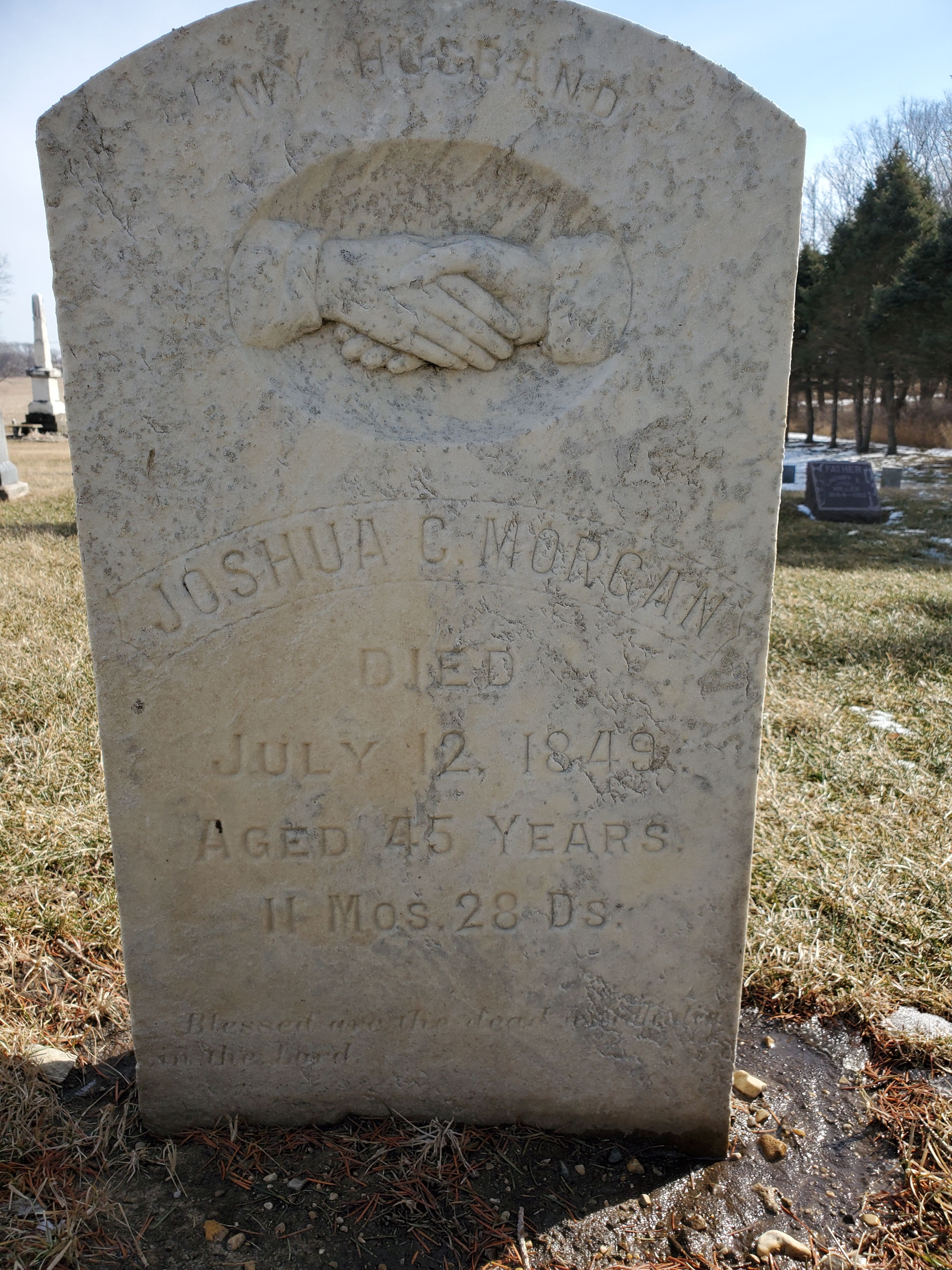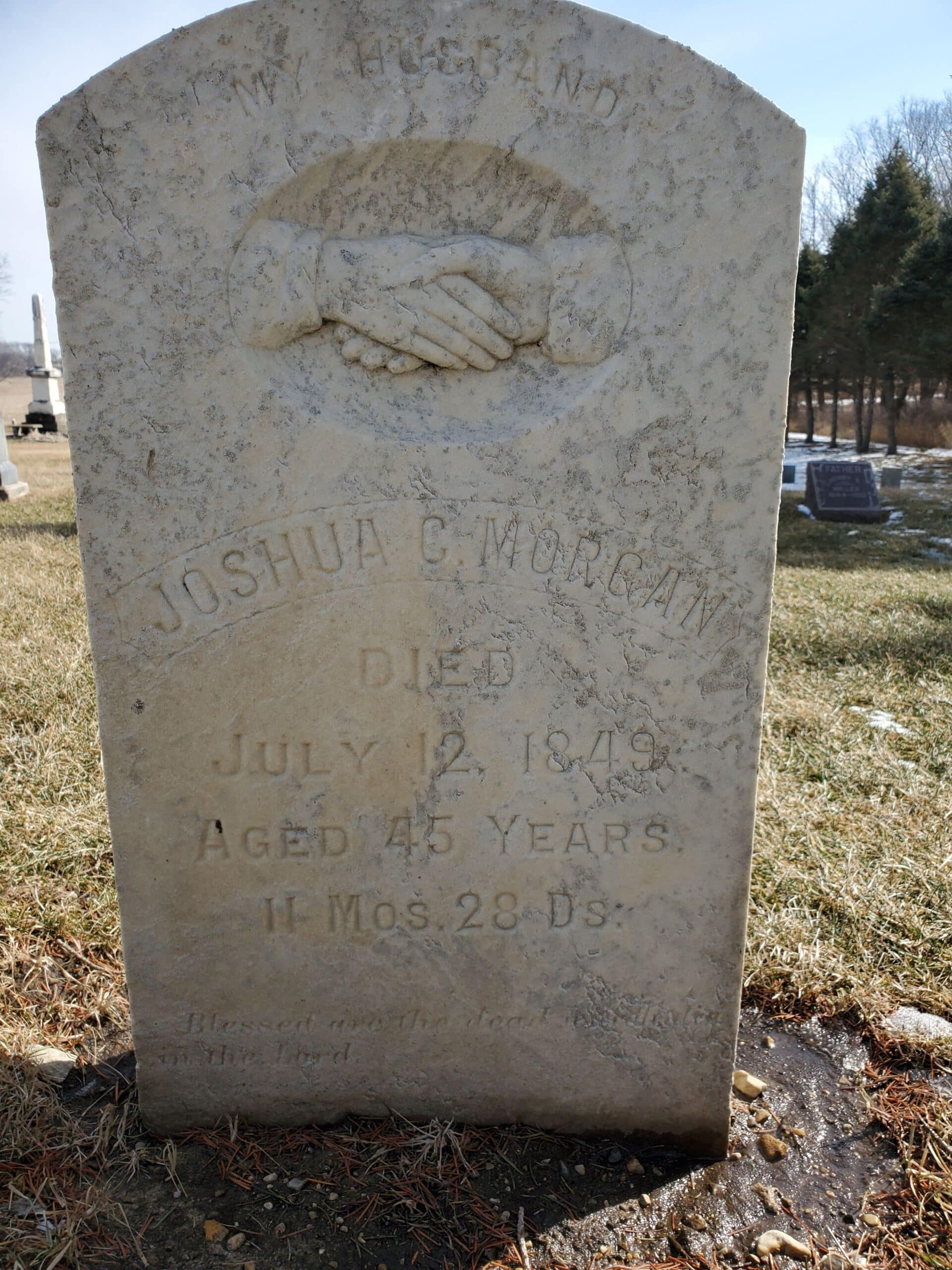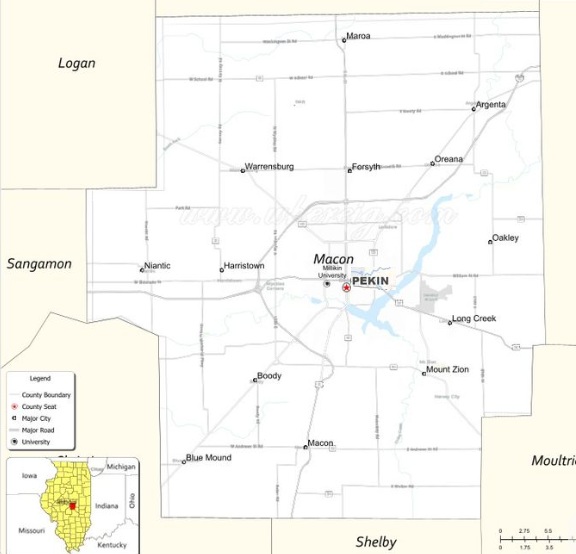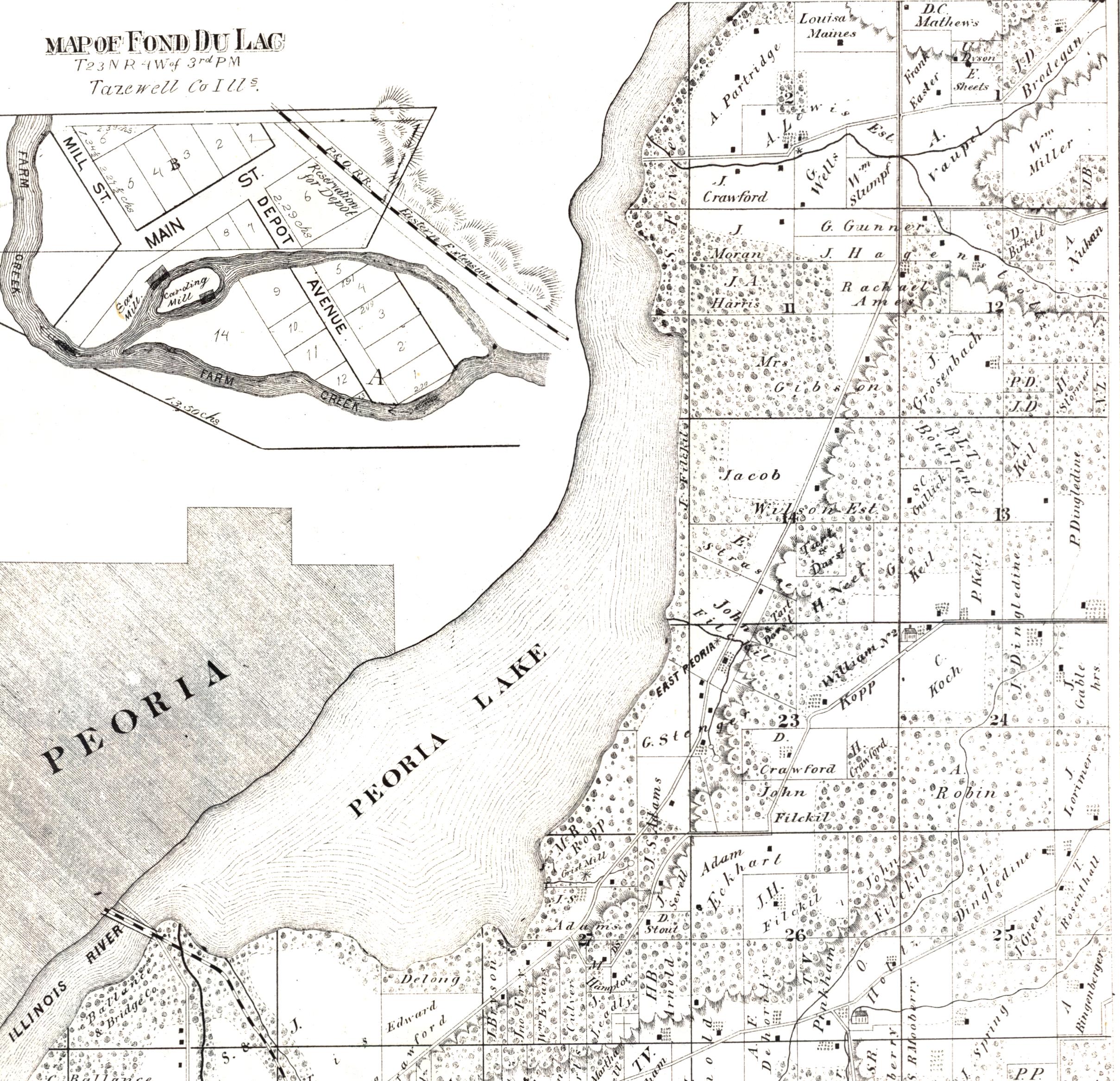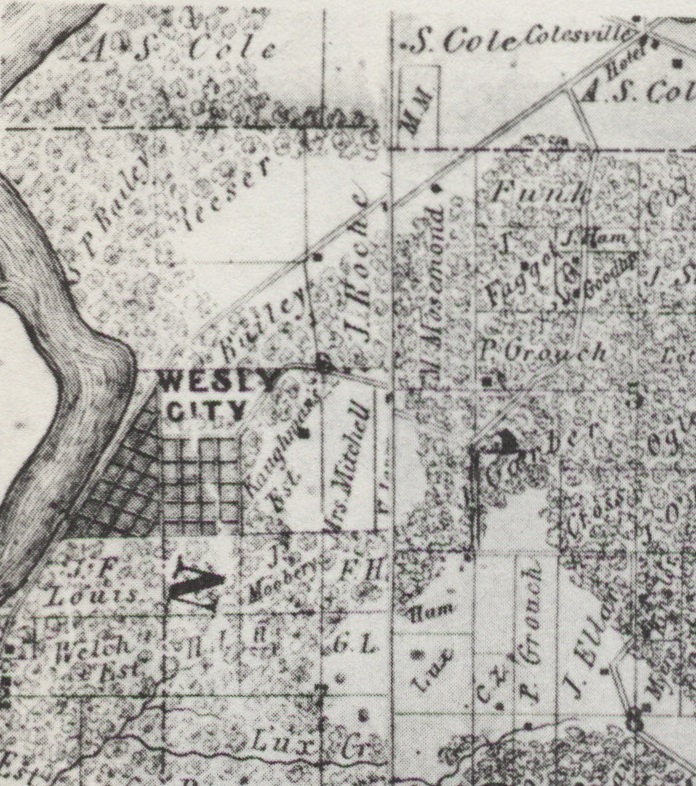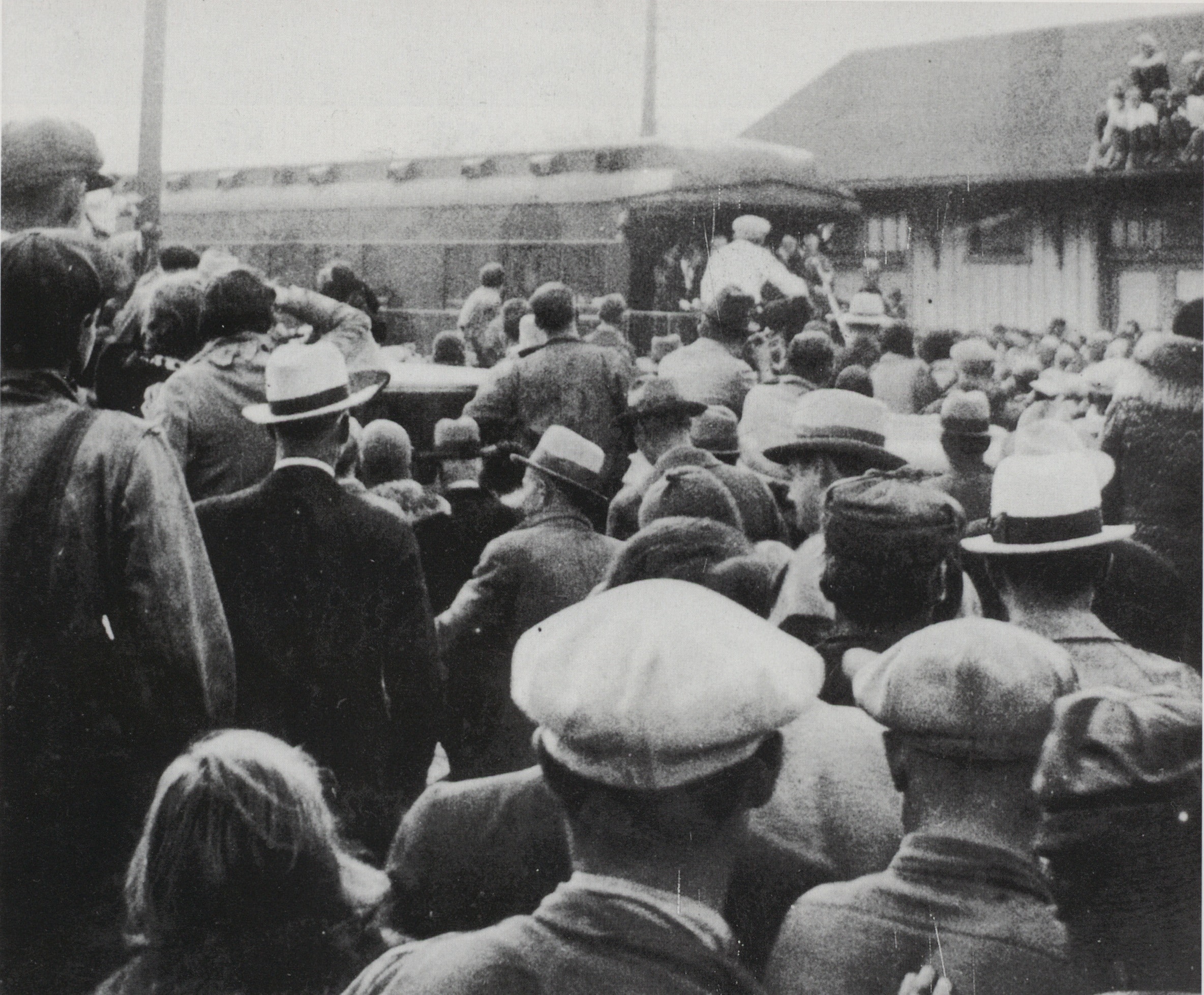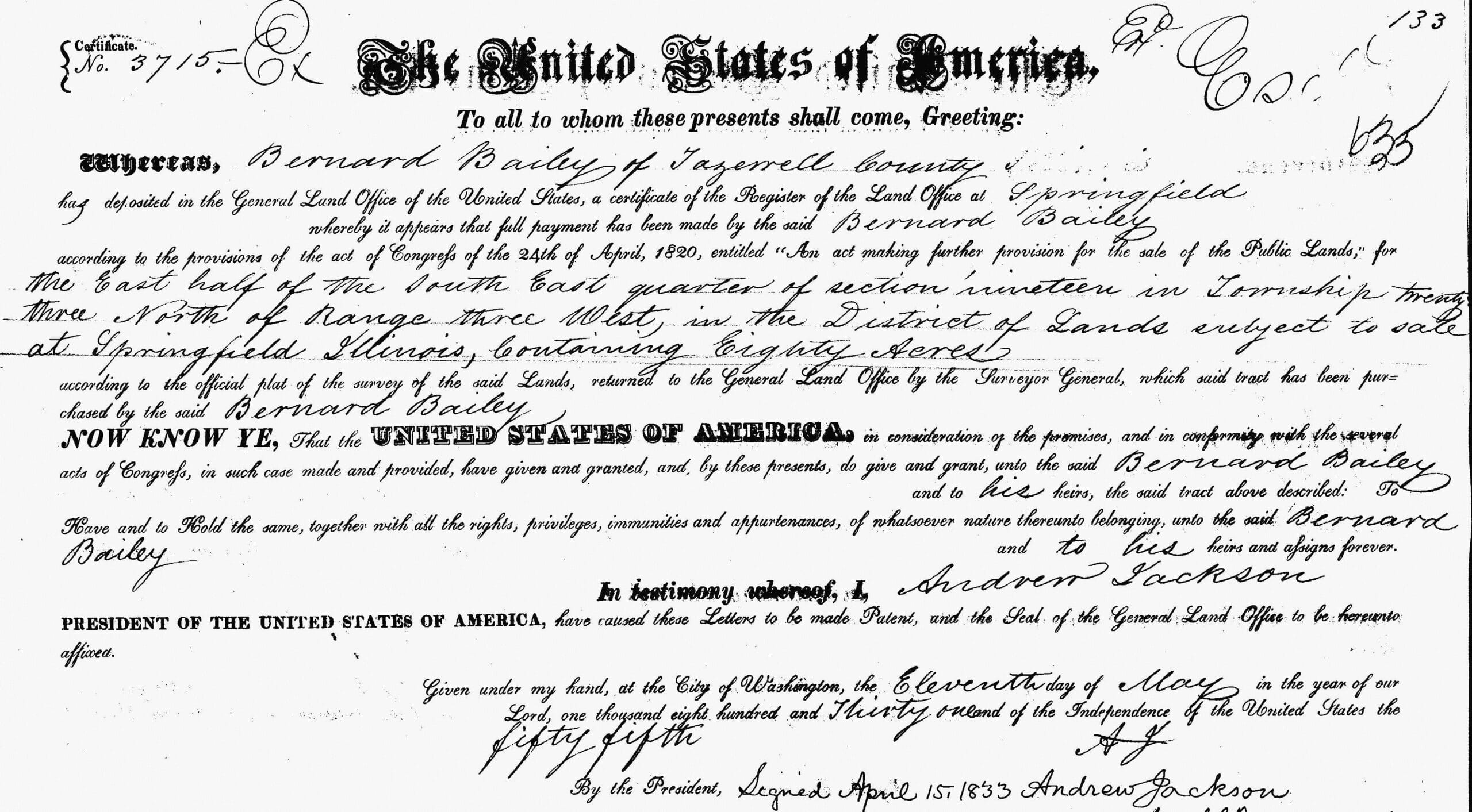As we continue our Bicentennial series on Pekin’s history, this week we will revisit the life of the man who served as the first president of Pekin’s Town Board of Trustees during the 1830s.
Joshua Carmen Morgan (1804-1849) was one of the most prominent of Pekin’s community leaders in the earliest years of its existence as a pioneer settlement was, and his name appears repeatedly in the early records of Pekin’s history. He was born 15 July 1804 in Xenia, Ohio, eldest son of Isaac and Margaret (Carmen) Morgan, who were natives of Virginia and Kentucky, respectively.
Turning to William H. Bates’ first-ever history of Pekin (which was included in the 1871 Sellers & Bates Pekin City Directory), we find the several notices regarding Joshua C. Morgan, all of them relating significant facts in Pekin’s early history.

First, on page 12 Bates informs that Morgan held most Tazewell County offices from 1831 to 1836:
“During the time intervening between the removal of the County Seat from Mackinaw to Pekin in 1831 and its removal from Pekin to Tremont in 1836, the offices of Circuit Clerk, County Clerk, Recorder, and Master in Chancery were held by Joshua C. Morgan, who was also post-master. He lived with his wife and four children, a brother and a young lady, and transacted the business of all his offices, in two rooms of the house now occupied by Dr. W. S. Maus. His house was also a great resort for travelers, and our informant says: ‘I have spent the evening at his house when the entire court and bar were there with many others.’”
While we can be grateful that Bates provided us with this description of Morgan and his important role in Pekin’s and Tazewell County’s early days, nevertheless there is a problem with his statement that Morgan’s house was “now” (i.e. in 1870-71) occupied by Dr. W. S. Maus. On page 46 of the same directory, Bates says Dr. W. S. Maus then resided in a home at the northeast corner of Logan St. and Park Ave., a very unlikely location for the home of one of Pekin’s earliest residents during the 1830s. However, Bates also mentions on page 46 that Dr. J. S. Maus then resided at the southwest corner of Elizabeth and Capitol, a far more probable site for Morgan’s home.
The unnamed informant’s recollection of seeing the entire court and bar being entertained in Morgan’s home means that the notable visitors to his house would have included men such as David Davis, John T. Stewart, and Samuel Treat, and later Stephen A. Douglas and Abraham Lincoln.
The very next paragraph of Bates’ history of Pekin, also on page 12 of the 1871 city directory, named J. C. Morgan among the settlers who had arrived in Pekin prior to 1831 and who had survived the “Deep Snow” of 1830. In addition to this information from Bates’ account, federal land records show that Morgan obtained letters patent for grants of land in Tazewell County on 15 Oct. 1834, 22 Oct. 1835, and 1 Nov. 1839.
At the bottom of page 12, Bates devotes a paragraph to the Black Hawk War of 1832. He does not mention, however, that Joshua C. Morgan himself served in the Illinois Militia during the Black Hawk War. The Illinois Secretary of State’s Illinois Veterans Index says Morgan served in the 5th Regiment of Whiteside’s Brigade, with the rank of Quartermaster, having entered the service at Dixon’s Ferry in what is now Lee County.
On page 13, Bates devotes a paragraph to the terrible cholera outbreak of July 1834 that carried away many of the pioneers not only of Pekin but other parts of Tazewell County:
“With the opening of July, 1834, Pekin was visited by the Asiatic Cholera, and for a time the village was enveloped in a pall of gloom, sorrow and despondency. Quite a number of prominent (sic) citizens, among whom we find the names of Mr. Smith, Mrs. Cauldron, Thomas Snell, Dr. Perry, Mrs. Perry, Mrs. J. C. Morgan, and many others, fell victims ere the terrible malady took its departure.”
Charles C. Chapman’s 1879 Tazewell County history, page 566, relates these same facts in very similar wording (showing that Bates’ account was Chapman’s source).
Mrs. J. C. Morgan was Almeda (Moore) Morgan, who had borne Joshua two daughters, Julia and Caroline, and two sons, Isaac and Frank. Joshua remained a widower for less than a year, for Tazewell County marriage records show that he remarried on 23 April 1835 to Elizabeth Green Shoemaker, who bore him five sons and two daughters, Alphonso, Jerome, Spencer, Charles, Sidney, Florence, and an unnamed daughter who died in infancy.
On 2 July 1835, the residents of Pekin voted to incorporate as a Town, which gave Pekin the right to govern itself through an elected Board of Trustees. This event, however, is not mentioned in Bates’ history of Pekin. As we mentioned last week, for some reason the incorporation vote was not legally recorded. (Morgan, as we have seen, was then the Recorder of Deeds.) That omission made it necessary for Pekin’s officials to ask the Illinois General Assembly to retroactively legalize the incorporation of the Town of Pekin, which the General Assembly did by a special act passed on 19 Jan. 1837.
Be that as it may, on page 13 of the 1871 directory Bates tells us the results of Pekin’s first Town election:
“‘July 9th, 1835, agreeable to notice given according to law, in the Court House, in the Town of Pekin, Tazewell County, Illinois, for the purpose of electing Five Resident Freeholders of the Town of Pekin, as Trustees of the same, who shall hold their office for one year and until others are chosen and qualified.’ The vote given was for D[avid] Mark, 24; D[avid] Bailey, 24; Samuel Wilson 17; J. C. Morgan, 22; S[amuel] Pillsbury, 24, and S. Field, 12. The five gentlemen first mentioned were elected, and the members were qualified before Alden Hull, a Justice of the Peace. On the 11th of the same month, the Board of Trustees was organized, J. C. Morgan being elected President, and Benjamin Kellogg, Jr., Clerk.”
Probably the most important act of Morgan’s administration as Pekin’s first Town Board President was the removal of the County Seat from Pekin to Tremont. The primary reason for the relocation of the County Seat was the then-prevailing opinion in the General Assembly that a County Seat ought to be geographically central within a county’s borders. Tazewell County was much larger when first erected in Jan. 1827, but by 1835 the county was much smaller due to portions of Tazewell County being reassigned to newly erected counties. Another consideration was that Pekin in the 1830s was something of a swampy place and (especially after the 1834 cholera outbreak) was regarded as sickly.
Bates tells the story of the removal of the County Seat to Tremont on page 14, and concludes his account with:
“The last meeting of the first Town Board was held on the 27th of June, 1836, at which meeting Joshua C. Morgan having removed the courts to Tremont, resigned, and Samuel Pillsbury presided.”
After that, Morgan no longer appears in Bates’ narrative of Pekin history. Although he is known to have acquired additional land in Tazewell County in late 1839, at some point after that he must have joined his parents and other relatives in Lee County, Illinois. He died in Palmyra in that county on 12 July 1849 and was buried in Prairieville Cemetery near Prairieville in Lee County. His widow Elizabeth later moved to Seward, Nebraska, where she died on 20 Oct. 1900 at age 85. She is buried in Clarinda Cemetery, Clarinda, Iowa.
